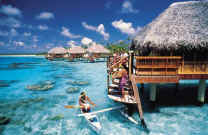





![]() Facts
of the Travel
Facts
of the Travel![]()
 itself.
Western European and Scandinavian citizens are allowed to stay for up
to three months without a visa. Citizens of Canada, the USA, Japan,
Singapore and New Zealand can stay up to one month without a visa, but
all other visitors need a visa to enter.
itself.
Western European and Scandinavian citizens are allowed to stay for up
to three months without a visa. Citizens of Canada, the USA, Japan,
Singapore and New Zealand can stay up to one month without a visa, but
all other visitors need a visa to enter.Health risks: None
Time: GMT/UTC minus 10 hours
Electricity: 220V, 60 Hz
Weights & measures: Metric
![]() When
to go
When
to go![]()
 period
which is, perhaps, the best time to visit the territory. Visitors
during this period should, however, take into account the maraamu
tradewinds which can bring unstable weather from the south between
June and August. The weather gets warmer and more humid between
November and the end of May. The Northern Hemisphere holiday periods -
Christmas to the beginning of January, late February/early March,
Easter, early May and the long northern-summer holiday in July-August
- are busy times and flights can be hard to get.
period
which is, perhaps, the best time to visit the territory. Visitors
during this period should, however, take into account the maraamu
tradewinds which can bring unstable weather from the south between
June and August. The weather gets warmer and more humid between
November and the end of May. The Northern Hemisphere holiday periods -
Christmas to the beginning of January, late February/early March,
Easter, early May and the long northern-summer holiday in July-August
- are busy times and flights can be hard to get.![]() Events
Events![]()

The Moorea Marathon
is held in early February, and there's a re-enactment of the arrival
of the first London Missionary Society missionaries at Point Venus in
Papeete on 5 March with  celebrations
in Tahiti's and Moorea's Protestant churches. Tahitians love beauty
contests and there are events organised for both men and women
throughout most of the year, and these culminate in the prestigious
Miss Heiva i Tahiti contest in July. The month-long Heiva i Tahiti
festival also features music, dancing, sporting competitions and arts
& crafts displays. French Bastille Day, 14 July, falls in
the middle of this festival and is the highlight. A four-day golf
tournament is held on Tahiti in late June and early July, the
Heiva No Te Pahu Nui O Tahaa stone-fishing festival takes place
on Tahaa during the last week of October and there's a surfing
contest off Tahiti in September.
celebrations
in Tahiti's and Moorea's Protestant churches. Tahitians love beauty
contests and there are events organised for both men and women
throughout most of the year, and these culminate in the prestigious
Miss Heiva i Tahiti contest in July. The month-long Heiva i Tahiti
festival also features music, dancing, sporting competitions and arts
& crafts displays. French Bastille Day, 14 July, falls in
the middle of this festival and is the highlight. A four-day golf
tournament is held on Tahiti in late June and early July, the
Heiva No Te Pahu Nui O Tahaa stone-fishing festival takes place
on Tahaa during the last week of October and there's a surfing
contest off Tahiti in September.
However, what draws the
whole of French Polynesia to a standstill is a canoe race. The Hawaiki
Nui canoe race is a three-day, four-island, 116km event, held in
early November, that pits about  60
six-man teams from all over the territory and abroad against each
other. Burly Polynesian men, often bedecked in traditional tattoos,
begin from the island of Huahine and cross 44.5km of open ocean to
Raiatea. Day two is a 20km sprint within the lagoon between the twin
islands of Raiatea and Tahaa, and day three is a mammoth 52km
open-ocean crossing to the island of Bora Bora. The vessels arrive to
the rhythm of drummers and cheering supporters, and TV camera crews
wade out to get the footage that will be broadcast across the
territory on the evening news. In 1994 a German team of Olympic
kayakers entered the race and their best result was 18th on the first
leg.
60
six-man teams from all over the territory and abroad against each
other. Burly Polynesian men, often bedecked in traditional tattoos,
begin from the island of Huahine and cross 44.5km of open ocean to
Raiatea. Day two is a 20km sprint within the lagoon between the twin
islands of Raiatea and Tahaa, and day three is a mammoth 52km
open-ocean crossing to the island of Bora Bora. The vessels arrive to
the rhythm of drummers and cheering supporters, and TV camera crews
wade out to get the footage that will be broadcast across the
territory on the evening news. In 1994 a German team of Olympic
kayakers entered the race and their best result was 18th on the first
leg.